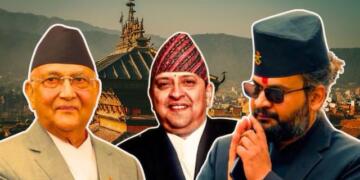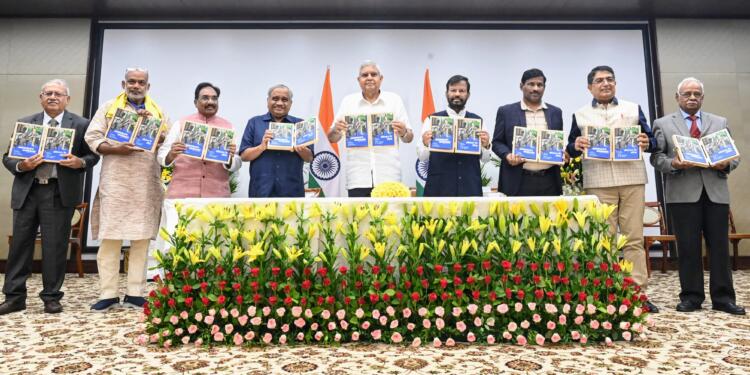Vice President Jagdeep Dhankhar has reignited a powerful national debate on Saturday saying that the words “socialist” and “secular” were not part of the original Constitution and were forcefully inserted during the dark days of the Emergency in 1976. Speaking at an event in New Delhi, Dhankhar said the Preamble India’s constitutional soul was altered during a time when democracy was crushed and citizens were silenced.
With the RSS general secretary Dattatreya Hosabale stating recently that “socialist” and “secular” were forcibly added to the Preamble, and that it’s time to reconsider these additions, the Vice President’s sharp criticism of the amendment has emboldened the idea that a return to the original constitutional spirit is not just desirable, but necessary. The demand has now found resonance at the highest constitutional levels, giving new life to a long-standing argument that these two terms are out of place in India’s civilizational framework.
Preamble Was Changed – A Travesty of Justice
Vice President Jagdeep Dhankhar did not mince words as he addressed a gathering during the release of the book Ambedkar’s Messages. Referring to the 42nd Constitutional Amendment passed during the Emergency, he declared that the insertion of “socialist”, “secular” and “integrity” into the Preamble was nothing short of sacrilege.
“The Preamble of any constitution is its soul. The Preamble of the Indian Constitution is unique. Except Bharat, no other country’s Preamble has undergone change,” he said. “Preamble is not changeable. Preamble is not alterable. Preamble is the basis on which the Constitution has grown. It is the seed of the Constitution.”
Calling the Emergency the “darkest period” of Indian democracy, Dhankhar lamented how “in the name of those ‘We the People’ who were enslaved, we just went for what? Just a flourish of words? It is to be deprecated beyond words.” He quoted legal luminaries like Justice H.R. Khanna and Justice Sikri, who had upheld the sacred character of the Preamble.
Dhankhar went further, declaring: “What a travesty of justice! First, we change something which is not changeable, alterable and then we change it during the Emergency. When ‘We the People’ were bleeding in heart, in soul they were in darkness.”
He described the additions made in 1976 as a “Nasoor” a festering wound. “These words have been added as Nasoor. These words will create upheaval. It is nothing but belittling the civilizational wealth and knowledge of this country. It is sacrilege to the spirit of Sanatana,” he said in a hard-hitting critique that echoed the sentiments of countless nationalists.
He closed by invoking Dr. Ambedkar’s warning from his final speech in the Constituent Assembly, where he said, “If parties place creed above country, our independence will be put in jeopardy a second time and probably be lost forever.” For Dhankhar, the Emergency-era amendment did exactly that placed creed and ideology above the Constitution’s original spirit.
Criticism surrounding the Emergency-Era Additions
The RSS has always maintained that the terms “secular” and “socialist” were politically motivated insertions made to distort India’s constitutional framework. RSS General Secretary Dattatreya Hosabale recently reignited the issue, accusing the Congress of never apologizing for forcibly amending the Constitution during Emergency.
“Those who added these words now carry the Constitution like a trophy. They still haven’t apologised,” he said, calling on citizens to demand a restoration of the pre-1976 Preamble. The RSS has consistently argued that India’s civilizational ethos is inherently inclusive and doesn’t need imported Western labels like “secularism,” which in practice has been misused for minority appeasement.
Congress, on the other hand, responded with predictable outrage. Rahul Gandhi accused the BJP-RSS of wanting to replace the Constitution with Manusmriti. But their arguments appear to be losing steam as more voices including those in high constitutional offices begin to question the legitimacy of what happened in 1976.
Why the Debate Matters More Than Ever Today
The call to revisit the Preamble is no longer a fringe demand. With voices like Vice President Dhankhar echoing the same concerns of millions of Indian citizens, the issue has entered the mainstream political discourse. The central argument remains clear: the Preamble was not meant to be tampered with, and certainly not during a time when the people had no voice, no vote, and no protection of fundamental rights.
The 42nd Amendment happened when democracy was suspended, opposition leaders were jailed, the press was muzzled, and judicial recourse was denied. Can words added in such a period truly represent the will of the people? Or should India now return to the vision set out by Ambedkar and the framers of the original Constitution?
Restoring the Soul of the Constitution
As the political debate intensifies, one thing is clear the demand to restore the original Preamble is gaining ground like never before. With the Vice President himself acknowledging that the Preamble was “casually, farcically, and with no sense of propriety” altered, the moral and constitutional legitimacy of those Emergency-era insertions stands severely questioned.























